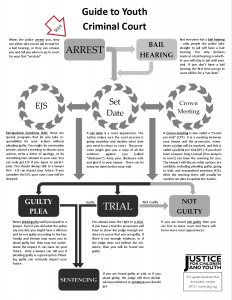The first time you go to court
After the police arrest you, you will have to go to court. There are two ways the police can get you to court after they arrest you:
- Promise to Appear or Undertaking
- Bail Hearing
Promise to Appear or Undertaking:
This is when the police don’t take you to jail, but let you go straight home instead of taking you to jail. If this happens the police will give you some papers that tell you when you have to go to court. There might be rules you have to follow until your court date. The papers also tell you when to go to the police station to give fingerprints and photographs. You must go to the police station and to court at the correct date and time. If you don’t, the police can charge you with a new crime. The papers tell you which police station to go to for your fingerprints and photographs. The papers will also tell you which court you have to attend.
Bail Hearing –see Bail section for more info:
The police can keep you in jail for a bail hearing. A bail hearing is when a Justice at the court decides if you should stay in jail until your trial. If this happens you should ask to speak to a lawyer right away – it is your right to speak to a lawyer. You should always speak to a lawyer before saying anything to the police. The police can give you the phone number for a free emergency lawyer called “Duty Counsel”. The police will take you to court within 24 hours or as soon as possible after they arrest you. You have the right to have a lawyer help you at the bail hearing. There will also be a Duty Counsel lawyer at the bail hearing who can help you.
At the bail hearing the Justice can only force you to stay in jail if you are charged with a serious crime or if there is a pattern of other charges against you. Usually, the Justice will only force you to stay in jail if she thinks that you will not come to court when you are supposed to or if she thinks you are going to commit another crime. If the Justice decides that you don’t need to stay in jail, she will tell you to follow certain rules or conditions when you leave the court. The Justice will also appoint an adult who is responsible for making sure you follow the rules. That adult is called a “surety”.
Steps in the Youth Court Process
Your Right to a Lawyer
You should always speak with a lawyer if you are charged with a crime. It is your right under the Youth Criminal Justice Act to have a lawyer represent you in court. See the back of this pamphlet for phone numbers you can use to find a lawyer.
Free Lawyers:
If you can’t afford a lawyer, Legal Aid may be able to give you a certificate (like a coupon) to get a lawyer. You should call Legal Aid Ontario: 1-800-668-8258. Many courthouses also have Legal Aid offices where you can apply for a certificate.
If Legal Aid does not give you a certificate for a lawyer, there is still another way for you to get a certificate: a judge can force Legal Aid to give you a certificate. You can take the paperwork from Legal Aid and show it to the judge in court. Then ask the judge to order Legal Aid to give you a certificate. If there is a specific lawyer you want, you can ask the judge to order Legal Aid to give you a certificate for that lawyer. This is a special right that is only available to young people, not adults.
Emergency Lawyers in the Court – Duty Counsel:
If you don’t have a lawyer when you go to court, there are free emergency lawyers called Duty Counsel. Duty Counsel can help you on the day you go to court but they will not be your permanent lawyers. Duty Counsel can help you with things like bail hearings, “set date” appearances, and extrajudicial sanctions (set dates and extrajudicial sanctions are explained on the middle page of this pamphlet). You should get your own lawyer if you have more complex or serious things that you need help with.
If you need Duty Counsel you should arrive early on the day of your court appearance and introduce yourself to Duty Counsel right away. There may be a lot of people at the Duty Counsel office so plan to get there early. If you don’t get a chance to speak to Duty Counsel before it is your turn in court, tell the Justice that you have not had a chance to speak to Duty Counsel yet and that you would like to. Sometimes Duty Counsel can even ask the Justice for a short break to give you a chance to talk.
What to wear in court
Always dress neatly for court. Courts are serious places and Justices expect everyone to take court seriously. You should not wear clothing with offensive words or designs. Do not wear any non-religious headgear. If you have headphones, you should remove them before going into the courtroom.
What to take with you
- Promise to Appear Form (if you have one)
- Bail Form or Recognizance (if you have one)
- Other court documents you have been given
- Other documents given to you by the prosecutor
- Other documents given to you by the police
- Photo Identification
- Documents to help you apply for Legal Aid
- A pen or pencil
- Paper or a notebook
Everyone who enters the courthouse is searched. Sometimes there is a metal detector. Sometimes a court officer will do a pat down search. Do not bring any illegal materials, weapons, or anything that could be used as a weapon. Even small key-chain or utility knives will be taken away.
What to do when you arrive at the courthouse
When you get inside the courthouse, find your courtroom. Your paperwork (Promise to Appear or reminder slip) should tell you what courtroom you are in. If you need Duty Counsel, find the Duty Counsel office and try to speak with a Duty Counsel lawyer as soon as possible.
In every courthouse there is a list or “docket”. This is an official list of everything scheduled that day. Try to find your name on the docket to make sure you have the right courtroom and date. Sometimes there is one big docket for the whole courthouse that is available at the main reception desk. Sometimes there are smaller dockets for each courtroom posted on the wall outside of each courtroom. If you do not find your name on a docket, go to the Duty Counsel office and ask for help.
What to do inside the courtroom
Take a seat on the benches. Wait there until your name is called. Turn off your phone. Do not chew gum. When the Justice comes into court or leaves court, everyone must stand. While you are seated, do not talk. Sometimes a court clerk or court officer will make announcements – you should listen carefully so that you don’t accidentally do something wrong. You should listen to each of the cases before yours. It will help you to get a better understanding of how the process works.
What to do when your name is called
Go to the front of the court and stand next to your lawyer. If you don’t have a lawyer, stand next to the Duty Counsel lawyer. The Justice will ask you your name. Speak loud enough for the Justice to hear. The Justice or a clerk will read your charge out loud. Listen carefully. Ask questions if you do not understand what is said. The Justice should explain things in a way that helps you to understand.
After the lawyers tell the Justice about your case, the Justice will tell you what you need to do before your next court date. The Justice will tell you what date to come back. Tell your lawyer right away if that is a bad date for you.
When court is finished for the day
When your court appearance is done, most courts will give you a reminder slip that tells you when to come back to court. In the hallway, write some notes. Write down anything you will need to remember (dates or things you have to do before the next court date). Write down what happened in court, including the names of the people who were dealing with your case. Keep all your notes together safely. Remember that any rules or conditions that you have to follow are the same after each court appearance. Continue to follow those rules and conditions.




